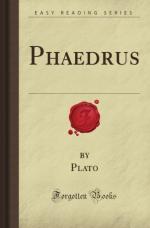|
This section contains 683 words (approx. 2 pages at 400 words per page) |

|
Phaedrus Summary & Study Guide Description
Phaedrus Summary & Study Guide includes comprehensive information and analysis to help you understand the book. This study guide contains the following sections:
This detailed literature summary also contains Topics for Discussion and a Free Quiz on Phaedrus by Plato.
Socrates runs into Phaedrus outside Athens, who follows his exercising routine suggested by their common friend and doctor Acumenus. Phaedrus has just left Lysias, son of Cephalus, a well known rhetorician and his lover, who gave a speech on love. Socrates convinces Phaedrus to share its details in a discourse. They analyze the content of the speech and the manner in which it is written.
Socrates, eager to follow any discourse, is determined to hear everything that Lysias and Phaedrus discussed. Their discussion is triggered by the speech written earlier concerning love. They both engage in the analysis of his writing, along with merits and faults. They analyze the subject of the nature of love and then other aspects of composition and writing. They discuss the content and the manner of writing. Lysias examines various types of love, considering a partner who is in love as less advantageous than the partner who is not in love. He finds love driven by emotions to be a burden for both partners. Dangers of love can be averted when passion is free from hate and allows for maintaining friendship with others without causing jealousy in a partner. Losing control can create difficult situations.
Socrates agrees with arguments given by Lysias when delivering his first speech. He is skeptical of the contributions that lovers can bring into their relationship. A relationship based on love can be more difficult than a relationship based on sex that is free from desire. When love is involved there is more opportunities for arguments. Lovers change while in a relationship. Such changes also involve transformations that may be unwanted by the partner, leading to disappointments for both. When reaching the end of his speech, Socrates comes to the conclusion that he failed to treat the matter fairly because he ignored certain points. As the god of love is Eros, failing to do justice in the right treatment of the matter may result in punishment. He decides to make another speech.
Socrates admits that he fears love sent by gods. Although lovers engage in madness that is dangerous, their love, being sent by gods, cannot be evil. Madness has been found to be part of various noble achievements. As part of artistic endeavor it involves mania. It is also godly because it is given by gods. To explore madness and love, it is essential to engage in the exploration of the soul. Souls engage in various activities that can make them fly high or be wingless, meaning they can be inspired or lack inspiration. Souls can be driven by different feelings depending on whether they are inspired by passion or the pursuit of beauty. Love can be part of passion or the pursuit of beauty, leading to a relationship appropriately based either on bondage or harmony. Reason bestows harmony while passion dependency. Relationships deprived of love are also calculative while depriving souls engaged in such relationships of noble and divine aspects. A relationship deprived of love leads to the inability to reach heaven in the after life. Socrates concludes that the divine love inspires while relationships deprived of love are condemned by gods, as the souls that engage in them fail to enter heaven. Love also involves wisdom and beauty. Their lack robs the soul of wisdom and mind.
Engaging in speech competition is also part of becoming immortal. Speaking involves the examination of various souls that characterize the audience. Apart from knowledge and understanding, all speeches require practice. The knowledge involves things that are certain and uncertain, and hence debatable, such as love. Through rhetoric the soul needs to be won and persuaded. Failing to incorporate various elements of speech, such as the beginning, middle and end, leads to failure in speech making. Speeches should start from the beginning, represented by the head, then form the body that consists of the right and left hand, symbolizing both sides of the argument. Hence arguments incorporate positive and negative aspects. Upon reaching a conclusion of what is good and bad writing, Socrates and Phaedrus carry their messages to their lovers.
Read more from the Study Guide
|
This section contains 683 words (approx. 2 pages at 400 words per page) |

|



